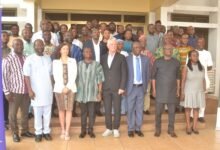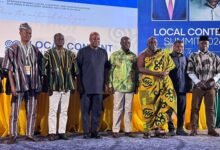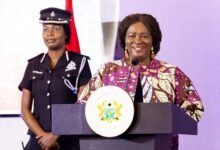
The Allied Health Professions Council (AHPC) yesterday inducted 170 people into various disciplines to begin a one-year housemanship in health facilities across the country.
The number comprises 113 medical laboratory scientists and 57 optometrists from the University of Development Studies (UDS), University of Cape Coast (UCC) and Kwame Nkrumah University of Science and Technology (KNUST).
The induction and oath-swearing ceremony on the theme: “The role of the Allied Health Professional: During and Post COVID-19”, is the first of series of induction ceremonies for some 3,000 persons who have completed various degree programmes in allied health across the country.
Speaking at the event, Deputy Minister of Health, Dr Bernard Oko Boye, who lauded health workers for their immeasurable role in the fight against COVID-19, entreated them to consider innovative ways in pressing home their demands as regards challenges surrounding their work.
He said the tendency of health workers to resort to strike actions puts the lives of patients at further risk, adding that, “we need to see our work as a whole enterprise and not a means to an end.”
“Let us see our profession as service to humanity rather than a means to earn a living. Salaries and allowances may not be enough to satisfy our desires, but the services we offer is what will serve as the key to open the heart’s desire we seek,” he said.
Dr Oko Boye indicated government’s commitment to the health workforce, noting that “in the last three years, we have given financial clearance to over 93,000 health workers and specific to the nurses, they tabled nine petitions and we are considering seven of them now, so it is not like we have left them to their fate.”
Dr Oko Boye urged the inductees to accept postings to any part of the country, as it afforded them “wider opportunities to support your career and build your experience.”
Registrar of the Allied Health Professions Council, Dr Samuel Yaw Opoku, in a remark, deplored the long period it took for graduates to be employed after serving their one-year internship.
He thus appealed to government to “address this critical issue, so that the population will benefit from the services of these professionals whose education was largely funded by the tax payer’s money.”
Dr Opoku cautioned the graduates against holding themselves as certified allied health professionals after their housemanship until they have taken and passed the Council’s Professional and Licensure Examinations.
“The period of internship, therefore, offers you the opportunity to acquire additional skills and knowledge as well as develop best professional standards which will constitute the basis of your certification,” he said.
BY ABIGAIIL ANNOH AND GLORIA NSIAH MINTAH







